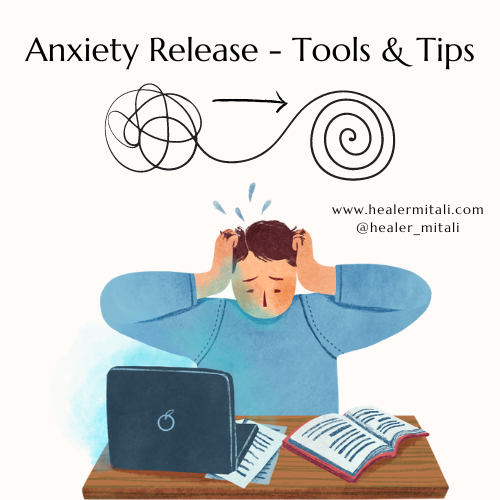Releasing anxiety is an important aspect of maintaining good mental health. While it’s important to consult with a mental health professional for personalized guidance, here are some strategies that may help in releasing anxiety:
- Deep Breathing:
- Practice deep breathing exercises by inhaling slowly through your nose, holding your breath for a few seconds, and then exhaling slowly through your mouth.

Breathe as deep as possible – Inhale & Exhale
Focus on the sensation of your breath entering and leaving your body, allowing it to calm your nervous system.
- Practice deep breathing exercises by inhaling slowly through your nose, holding your breath for a few seconds, and then exhaling slowly through your mouth.
- Progressive Muscle Relaxation:
- Tense and relax each muscle group in your body, starting from your toes and working your way up to your head. This technique helps release physical tension and promotes relaxation.
- Grounding Techniques:
- Engage your senses by focusing on the present moment. Notice and describe specific things you can see, hear, touch, smell, or taste. This practice helps shift your attention away from anxious thoughts and brings you back to the present reality.
- Mindfulness Meditation:
- Practice mindfulness meditation to cultivate awareness and acceptance of the present moment. Observe your thoughts and emotions without judgment, allowing them to come and go.

Become aware of the Present Moment
Mindfulness can help create distance from anxious thoughts and reduce their intensity.
- Practice mindfulness meditation to cultivate awareness and acceptance of the present moment. Observe your thoughts and emotions without judgment, allowing them to come and go.
- Engage in Physical Activity:
- Engaging in physical exercise releases endorphins, which are natural mood boosters. Choose activities you enjoy, such as walking, jogging, dancing, or yoga. Exercise not only reduces anxiety but also promotes overall well-being.
- Challenge Negative Thoughts:
- Identify and challenge negative or anxious thoughts. Ask yourself if there is evidence to support these thoughts and consider alternative perspectives.

Write your thoughts down and create affirmations for the best life
Replace negative thoughts with positive affirmations or more realistic and balanced thinking patterns.
- Identify and challenge negative or anxious thoughts. Ask yourself if there is evidence to support these thoughts and consider alternative perspectives.
- Self-Care Practices:
- Prioritize self-care activities that promote relaxation and stress reduction. Engage in activities you enjoy, such as taking a bath, practicing hobbies, reading, listening to music, or spending time in nature.

Make time for the self and the things that make you happy
Taking care of yourself physically and emotionally can help alleviate anxiety.
- Prioritize self-care activities that promote relaxation and stress reduction. Engage in activities you enjoy, such as taking a bath, practicing hobbies, reading, listening to music, or spending time in nature.
- Seek Support:
- Reach out to trusted friends, family members, or support groups who can provide a listening ear and emotional support. Sharing your feelings with others can help lighten the burden of anxiety and provide a different perspective.
- Limit Exposure to Stressors:
- Identify and minimize exposure to stressors that contribute to your anxiety. This may involve setting boundaries, practicing time management, or reducing your exposure to news or social media if it triggers anxiety.
- Professional Help:
- If anxiety persists and significantly interferes with your daily life, consider seeking professional help.

Seek Professional help & Therapy
A mental health professional can provide guidance, therapy, or other interventions tailored to your specific needs.
- If anxiety persists and significantly interferes with your daily life, consider seeking professional help.
Remember, it’s important to find a combination of strategies that work best for you. Experiment with different techniques and be patient with yourself as you navigate the process of releasing anxiety.
Book an Appointment: http://www.healermitali.com
Follow: http://www.instagram.com/healer_mitali
—PEACE—


